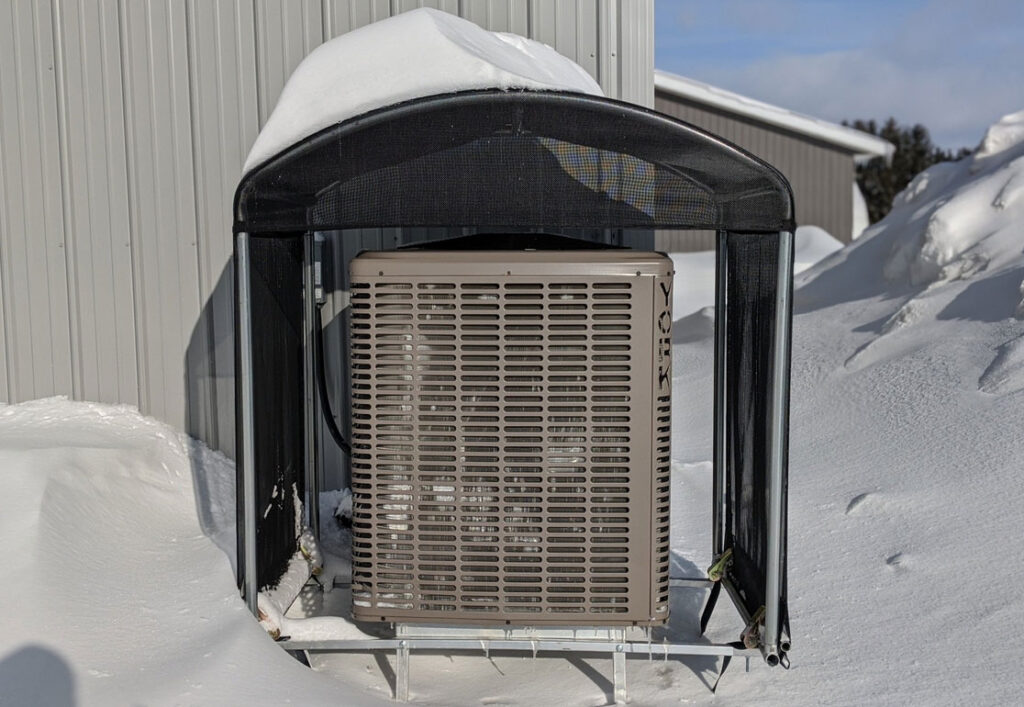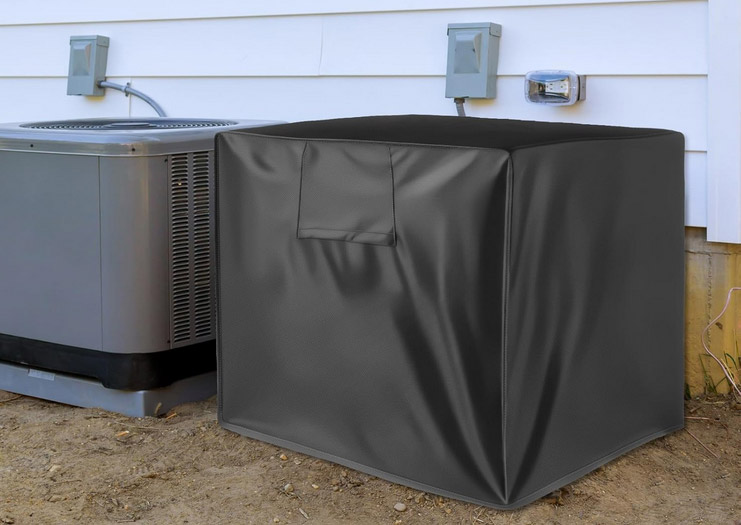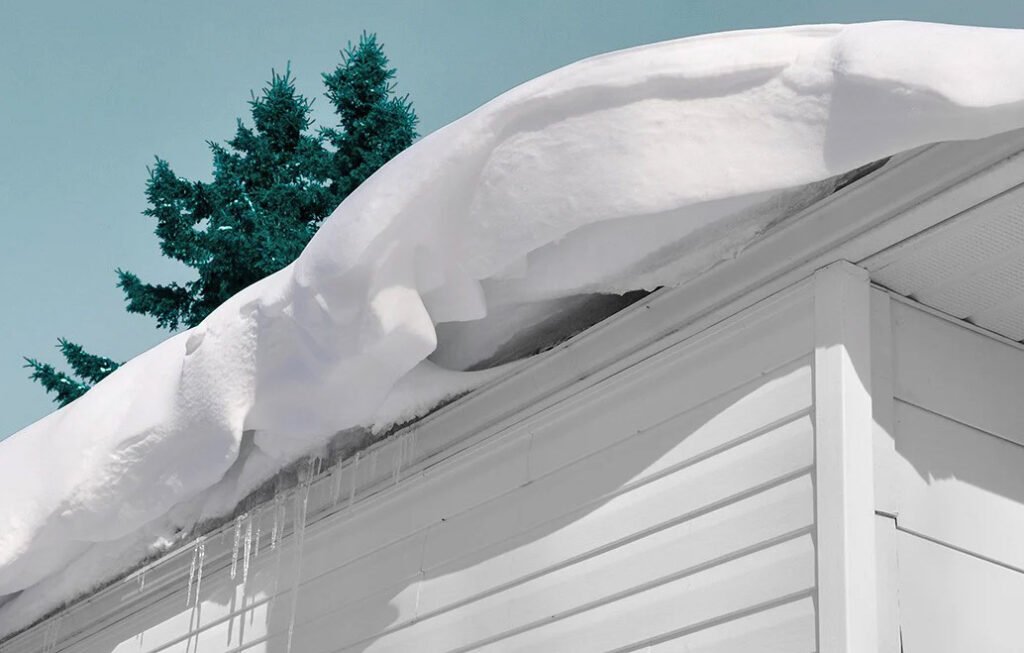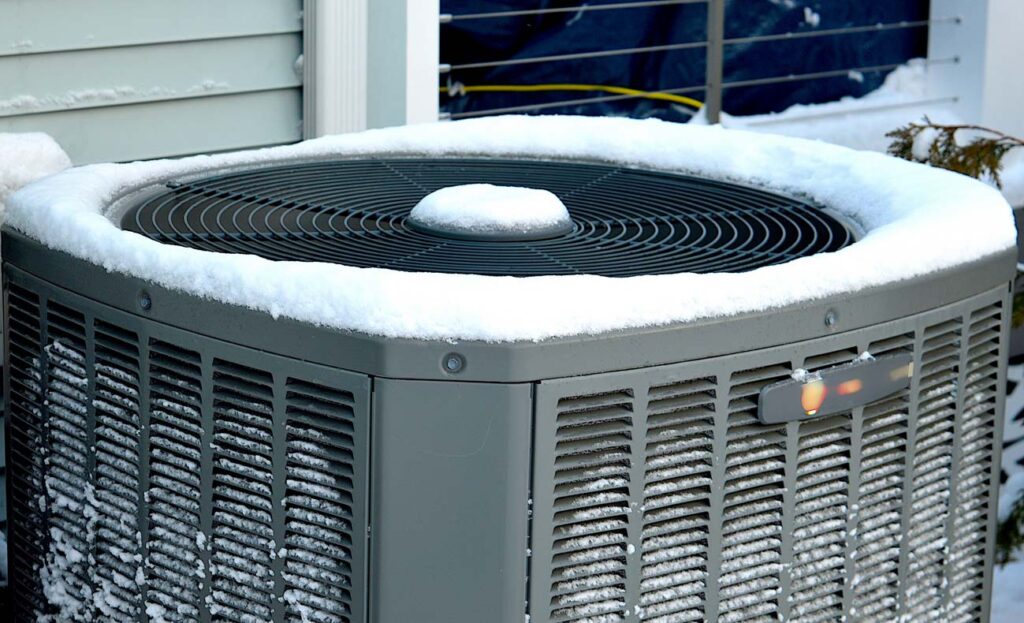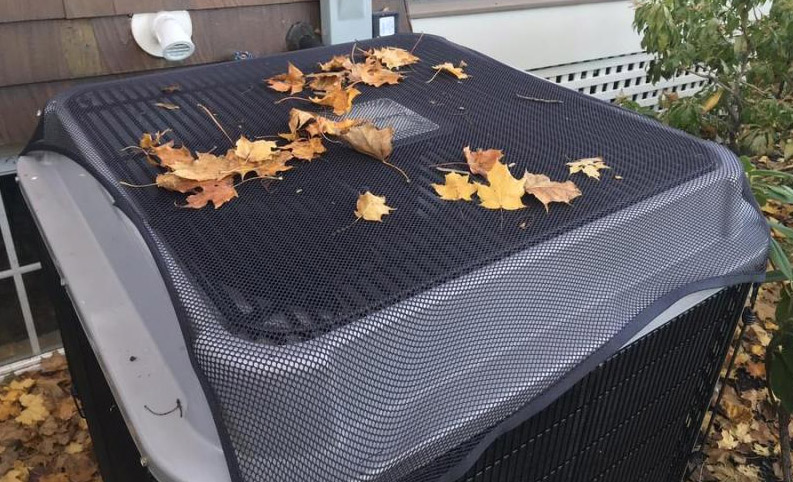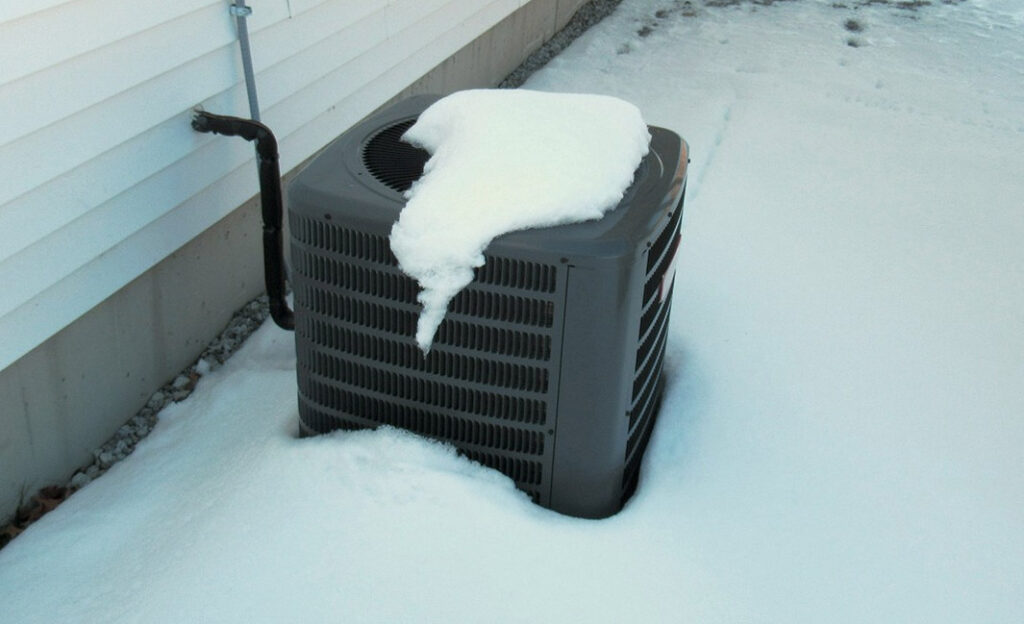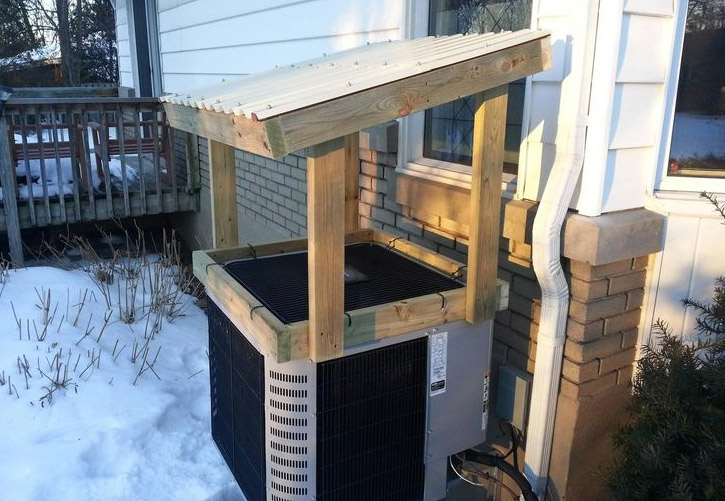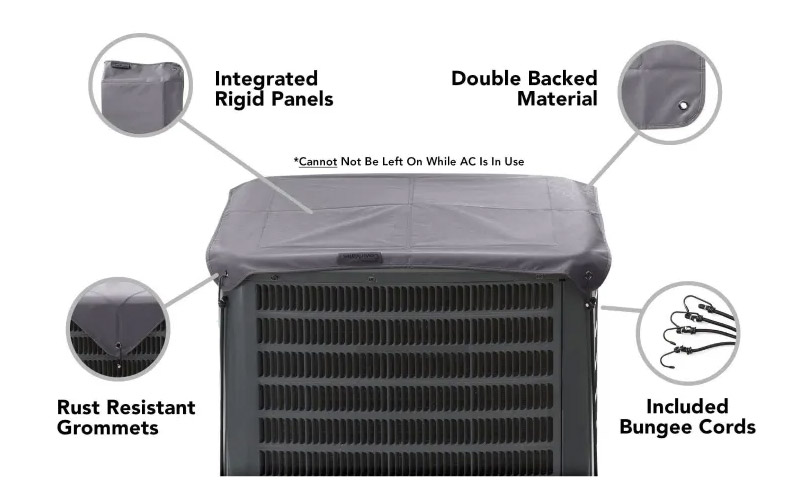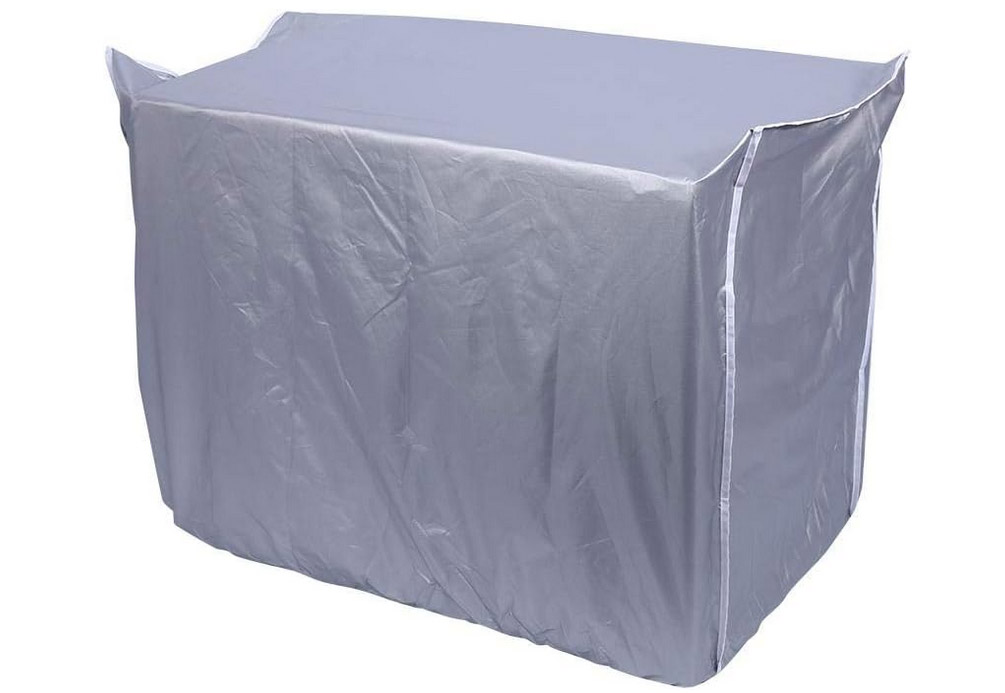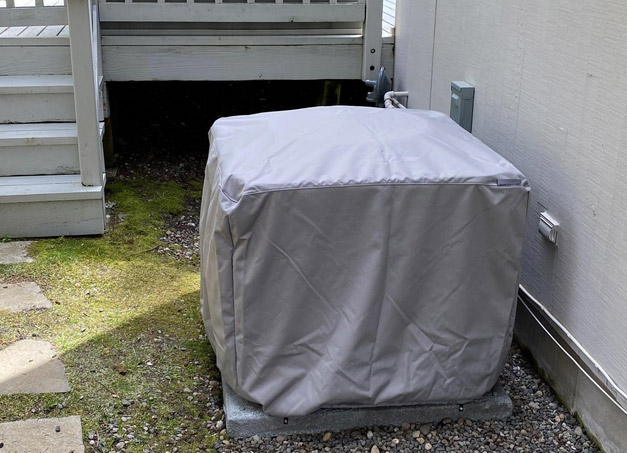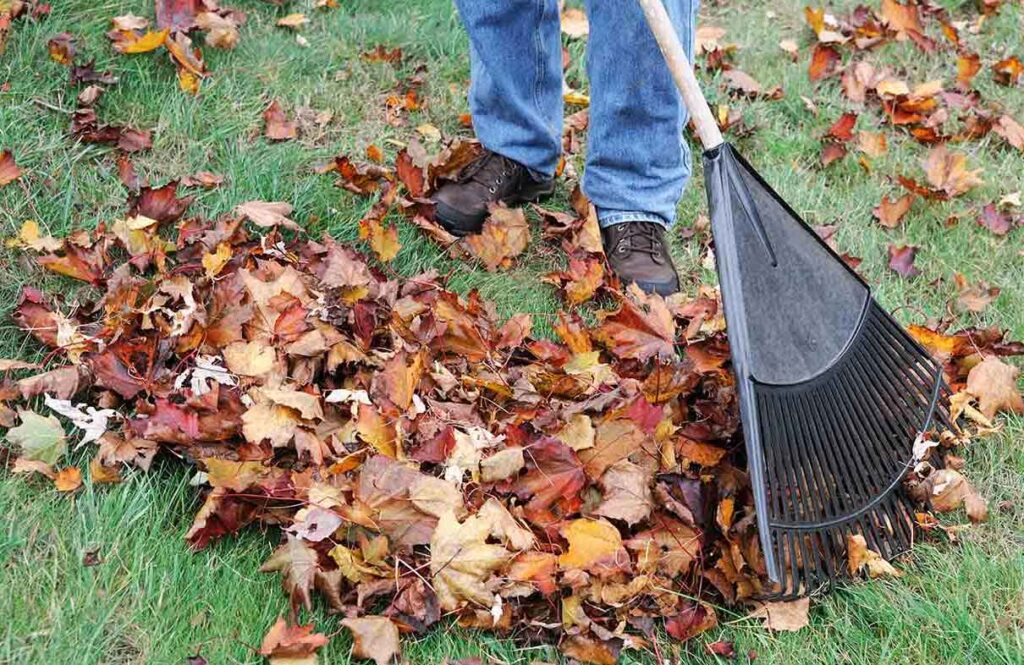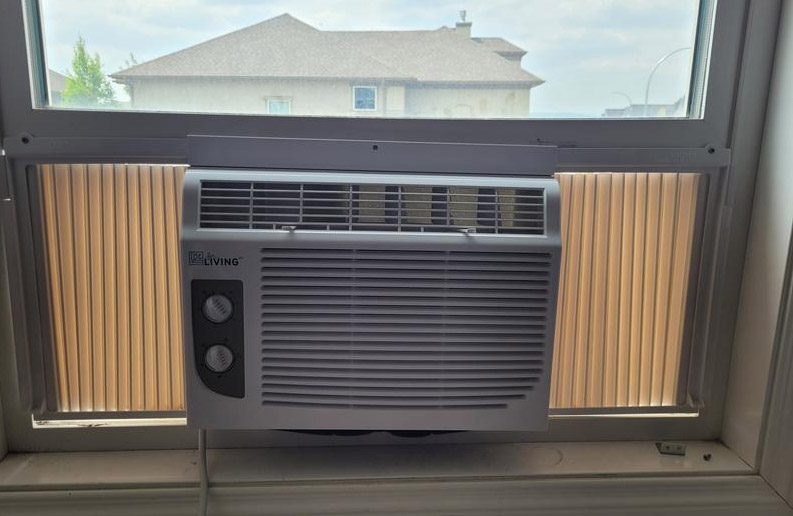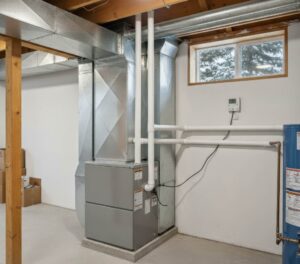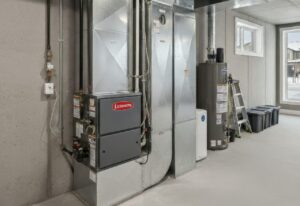What’s the best protection for your outside air conditioning unit during a midwinter blast from the polar vortex?
Some Calgary homeowners cover their outside AC units in winter to protect them when they’re not in use from the threats of snow and ice.
Is this the right move? Could it cause any damage to your air conditioning unit or impact its efficiency when you need it during the warmer months?
What should you do with your air conditioner when your home relies on the heat of the furnace to get you through winter?
Let’s find out…
SHOULD I COVER MY AIR CONDITIONER IN THE WINTER?
It’s generally best to cover your air conditioner in winter to protect it from the snow and ice if you experience severe winters. However, it’s important to get the timing right, use the right type of cover and, before covering your AC, ensure that the thermostat is not set to “cool” mode or the breaker is off. Otherwise, the AC may start while covered and damage the system.
Calgary winters don’t see consistently low temperatures because of the warm Chinook winds that blow. While these won’t usually activate any cooling requirements, spring can come quickly at times. So, it’s best to wait to cover your AC until the winter is showing signs of setting in. Don’t forget to set a calendar reminder to remove the cover well before any spring weather starts to arrive.
MAKE THE RIGHT HEATING & COOLING DECISIONS…
For over two decades, Alberta Mountain Air has helped Calgarians solve heating and cooling problems and maintain ideal comfort levels. Get in touch online or call 403-236-4366 for a quote.
WHY COVER YOUR AIR CONDITIONER IN WINTER?
Most Calgary homeowners spend significant money on their HVAC equipment. Staying warm in winter and cool in summer is challenging and we need all the help we can get.
With the generally high cost of air conditioning in Calgary these days, it pays to take a few precautions with your AC (or heat pump).
In split system air conditioners, which are by far the most popular here, the condenser unit sits outside the home, exposed to the elements. Those elements usually include several feet of snow and ice for several months of the year in Calgary.
It may seem obvious to cover your air conditioning unit to protect your investment, and most times, you’d be right to do so—but with a few caveats to bear in mind.
Modern systems are more snow-proof
If you purchased your AC in Calgary quite recently with a reputable supplier, it’s likely designed to stand up to the rigours of our climate. It’s probably quite weather-resistant and the newer it is, the more likely that’s the case.
Modern AC systems are rigorously tested in all types of extreme weather and if units were failing regularly after being exposed to cold temperatures, snow, and ice, you’d hear about it.
Condensers in modern systems are generally fitted with high-quality materials and a highly durable finish to withstand all levels of snow, rain, and the sun’s rays.
The key components of the system (such as the coils, compressor, and fan motor) are housed within the encasing and also designed to hold up to extreme heat and cold.
So, ultimately, “normal” amounts of snow and ice won’t usually damage your AC.
The threats are not just snow and ice…
The weight of snowfall and ice build-up may be the main reason to be concerned about leaving your AC uncovered in winter in Calgary—but there are other potential hazards.
Leaves in the fall, vegetation growing in spring, and debris gathering during periods of inactivity can all impact the efficiency and performance of your air conditioning.
The positioning of your outdoor AC unit is a key factor—which is why it’s important to get AC professionally installed in Calgary. If there are overhanging trees near your AC unit, falling twigs, leaves, seeds, berries, and bird waste can drop onto the unit, which can cause issues.
Similarly, overhanging gutters and roofing can form icicles that can potentially fall onto your unit. If the top of the unit is left uncovered or unprotected by a sturdy cover, this may cause damage to the unit.
It helps to perform annual AC maintenance in the spring but between the fall and the spring, fallen debris may have already worked its way into the system or the damage from icicles may already have been done.
That’s why it’s best to cover the AC if your unit is poorly positioned—either from poor installation practices or because it was unavoidable.
Extend the life of your AC unit
You may hear some advice NOT to cover your AC unit in the off-season in more temperate climates.
That’s because of the risks of moisture mold, corrosion, and wildlife (more about this below). It usually refers to full covers (plastic or non-breathable) rather than top-only covers.
Our advice is still to cover your AC in Calgary because of the extremes we experience in winter. We believe it can extend the life of the condenser unit.
HOW TO COVER YOUR AIR CONDITIONER IN WINTER—AND WHAT NOT TO DO
The most important part of your air conditioner to cover is the top. Sturdy top protection will prevent falling items from damaging the components or unnecessary build-up of heavy snow and ice directly on the unit. The cover will attach to the top of the unit and provide an effective barrier while still allowing good airflow so that moisture can’t build up.
If you’re not much of a DIY enthusiast, you can purchase these types of covers relatively cheaply in most of the major online marketplaces or hardware stores. You will find all sorts of covers available, including:
- Mesh covers
- Top-only covers
- Armor-plated covers
- Insulated covers
- Adjustable covers
- Water-resistant covers
If you decide to make a plywood cover, make it for the top of the unit only to protect the key components.
Simply measure the dimensions of your outdoor AC unit or check with the manufacturer whether there is a recommended weather protector attachment for your outside unit. A standard size for a top cover is 32” x 32” and this will fit most units.
What not to do when covering your AC
Many homeowners opt for full-size AC covers. These may look like the obvious choice but they can cause some issues—most notably with moisture retention. Trapping any humidity and condensation can lead to mold, mildew, and rust or corrosion on the condenser coil or the interior of the unit, potentially impacting efficiency. It may also attract vermin and other critters that will call the safe, warm space “home” underneath the cover.
For these reasons, avoid plastic covers or full covers that lock in moisture and don’t allow the unit to “breathe” and release moisture.
If you choose a full cover for your AC, ensure that it’s breathable so that it doesn’t retain excess moisture. Avoid cheap. non-breathable options.
WHAT HAPPENS IF THE AC STARTS WITH ITS COVER STILL ON?
Remember, some units have “covers” that protect them all year from falling debris, snow and ice. Others are affixed to the top or completely cover the AC unit only during winter.
It may seem like an AC emergency at the time but if you make the alarming mistake of running your AC unit while a full cover is left on, you may be lucky enough that nothing major happens.
However, if the AC doesn’t turn on again when the cover is removed, call a qualified AC repair professional to inspect your system and do any necessary repairs. Sometimes, the cover prevents the working system from dispersing heat once it reaches the outside of the home, causing it to freeze up or shut down. If the fan motor or compressor is damaged, this can lead to expensive AC repairs in Calgary.
HOW ELSE SHOULD YOU WINTERIZE YOUR AC UNIT?
Covering your unit in winter is not an absolute necessity in Calgary (though it’s advisable)—but clearing any debris and vegetation that may accumulate around the unit during the months when it’s not being used is essential to protect and make the most of your AC.
Leaves, pine needles, branches, animal nests, and more can work their way into the cooling system and cause damage that affects the unit’s efficiency and performance over time.
FAQs
What if I have a heat pump installed?
Heat pumps are increasingly replacing more traditional AC heating systems in Calgary due to their generally lower running costs and greater versatility. Because heat pump technology can cool AND heat your home, the outside unit of a heat pump is likely to be used all year round and should not be covered in winter when it’s needed to heat the home.
Should you use AC covers in high-humidity climates?
It’s generally best to avoid using air conditioner covers in high-humidity climates that experience high rainfall. Moisture is more likely to become trapped under the cover and lead to damage.
I have a window AC unit. Should I cover it in winter?
Most Calgary homes use central AC or ductless mini-split air conditioning (especially in condos and units). Window units are rare in Calgary and are not intended to remain in place all year round. They should be unplugged and removed from the windows when the weather turns cold rather than covered.
PROTECT YOUR AC IN WINTER AND ALL YEAR…
Protecting your AC makes good sense—AC repairs and replacement can get costly. The best way to do that all year round is with regular AC maintenance at the end of the summer.
In between times, when the air conditioning is not in use, you can cover your outside unit to protect it from the elements and falling debris—but be sure to choose the right type of cover to avoid any issues with rust, mold, mildew or vermin.
Standard amounts of snow and ice won’t usually harm modern AC units but with our extremes in Calgary, covering your unit (the right way) will provide added protection and peace of mind.All of our HVAC professionals are SAIT-certified and trained to service and repair any type or brand of air conditioner in Calgary. Call us at 403-236-4366 or contact us online.
